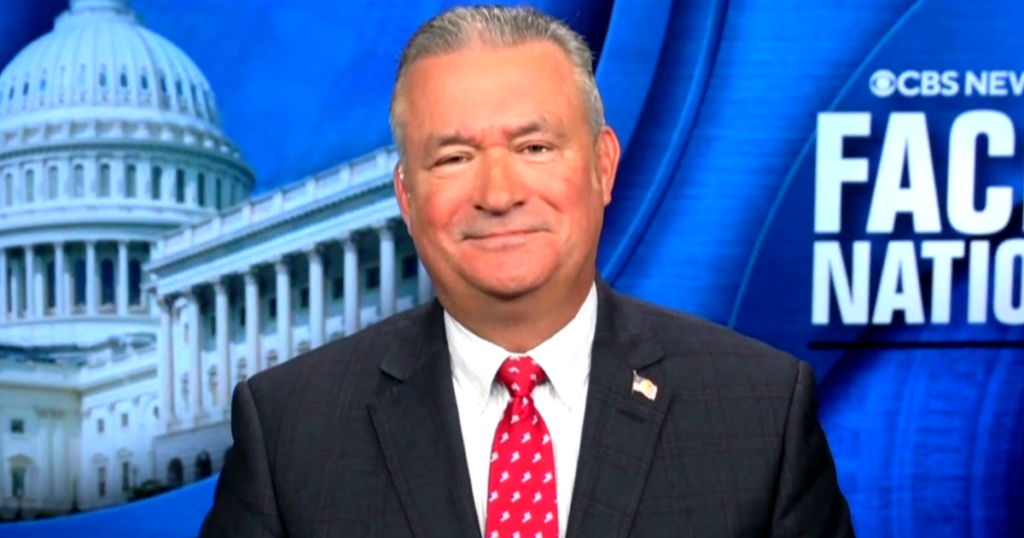In a recent interview, Congressman Don Bacon of Nebraska addressed pressing issues regarding tariffs, national security, and the recent changes within the military leadership under President Trump. Focusing on the implications of restricted congressional control over tariffs, he voiced his concerns about the evolving executive authority in this area. Furthermore, he criticized the unexpected dismissal of key leaders at the National Security Agency, emphasizing the potential risks this poses to national security and cyber operations.
| Article Subheadings |
|---|
| 1) Congressman Bacon’s Stance on Tariffs |
| 2) Congressional Control and Tariff Legislation |
| 3) The Impact of Leadership Changes in National Security |
| 4) Oversight and Accountability in Military Leadership |
| 5) The Future of U.S. Cyber Operations |
Congressman Bacon’s Stance on Tariffs
During the interview, Don Bacon articulated his support for existing legislation aimed at regulating tariffs. He expressed concern over the current administration’s approach, noting that while some Congressional leaders have already made moves to restrict the ability to amend tariffs, he believes it is vital for Congress to regain its authority over these decisions. The Congressman pointed out the historical lessons learned from protectionist measures in the past, arguing that such approaches could be detrimental to economic stability. With stakeholders keeping a close eye on inflation and unemployment rates, Bacon suggested that pressing economic indicators may eventually shift opinion about tariffs, particularly if they threaten to disrupt the stock market.
Congressional Control and Tariff Legislation
Following his earlier comments, Don Bacon elaborated that efforts to pass new tariffs legislation in the House of Representatives are likely to be more challenging than in the Senate. The Congressman acknowledged that while he has found some support within both chambers, the political landscape remains complex. He highlighted the necessity for bipartisan support, especially given the traditional skepticism about tariffs among some Republicans. His belief is that strong economic conditions or market declines could bolster the effort to reclaim congressional authority over tariff policy. In a broader context, he emphasized the imperative for Congress to assert its constitutional powers regarding tariffs, a scenario he labeled as critical to ensuring fair trade practices.
The Impact of Leadership Changes in National Security
In response to queries regarding the dismissals of key figures at the National Security Agency (NSA), Bacon did not mince words. He expressed profound discontent over the abrupt removal of General Haugh, a leader he characterized as “the absolute best.” Bacon indicated that the decision, reportedly made after a meeting with controversial figures, could hinder the United States’ strategic capabilities. These dismissals not only disrupted organizational continuity but also raised alarms about the motivations behind such significant changes. The Congressman reminded listeners that the NSA and Cyber Command work hand in hand, suggesting that severing their leadership could jeopardize national cybersecurity efforts, particularly at a time of increasing global tensions.
Oversight and Accountability in Military Leadership
As a member of the Armed Services Committee, Don Bacon assured that oversight would be established for the recent military leadership changes. He commented on the need for thorough inquiries to ensure that the precipitating factors behind these dismissals are understood and justified. While he acknowledged the president’s constitutional authority to make such appointments, Bacon stressed the importance of appropriateness in decision-making. His commitment to transparency was evident as he expressed readiness to question military leadership on the implications of these removals and the effect on operational readiness.
The Future of U.S. Cyber Operations
Looking to the future, Don Bacon raised concerns about the functionality and efficacy of U.S. cyber operations in the wake of these leadership shifts. By suggesting that separating the leadership of the NSA from Cyber Command could disrupt vital communication lines, he warned that such a move could lead to inefficiencies. He urged a collaborative operational strategy between the two entities, arguing that creating divisions could significantly undermine the nation’s capability to counter cyber threats posed by adversaries like China and Russia. Going forward, he emphasized the need for coherent and unified military leadership that prioritizes national interests and security.
| No. | Key Points |
|---|---|
| 1 | Congressman Don Bacon advocates restoring Congress’s control over tariffs amidst executive overreach. |
| 2 | Potential economic indicators, including inflation and employment rates, could influence legislative momentum regarding tariffs. |
| 3 | The dismissal of General Haugh from NSA raised alarms about leadership changes and their impact on national security. |
| 4 | Congressman Bacon plans to pursue oversight hearings regarding recent military leadership vacancies. |
| 5 | The importance of cohesion between NSA and Cyber Command is crucial for effective U.S. cyber operations. |
Summary
In conclusion, Don Bacon‘s remarks reflect a significant apprehension regarding the shifts in policy and leadership that affect both domestic and national security issues. His call for congressional authority over tariffs highlights the ongoing debate about the balance of power in governmental decision-making. Furthermore, his concerns about the implications of dismissing key military leaders resonate in discussions about the future effectiveness of U.S. cyber defenses amidst increasing global threats. These developments warrant continuous scrutiny and reflection on the principles underlying U.S. governance and security.
Frequently Asked Questions
Question: What is Don Bacon‘s position on tariffs?
Congressman Don Bacon advocates for restoring congressional authority over tariffs and is critical of recent executive actions that limit that authority.
Question: How could economic indicators impact tariff legislation?
Changes in inflation rates and employment figures could significantly affect the momentum for tariff legislation, as these indicators influence public and congressional sentiment.
Question: Why are leadership changes in the NSA concerning?
The abrupt dismissal of key leaders is a concern for national security, as it may disrupt effective cybersecurity operations and reduce the nation’s preparedness against cyber threats.


